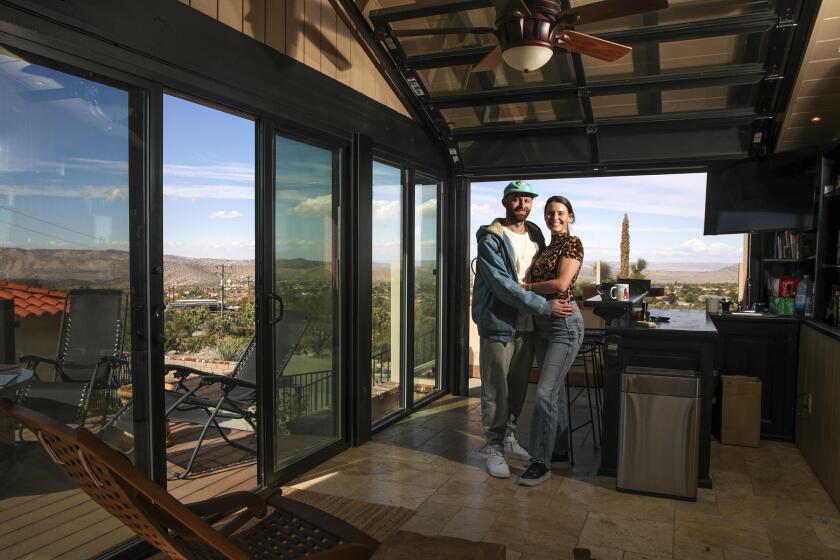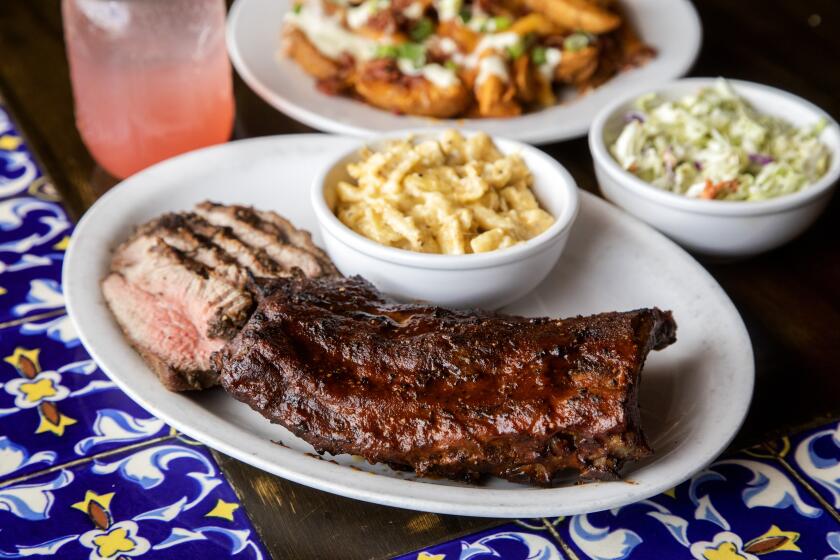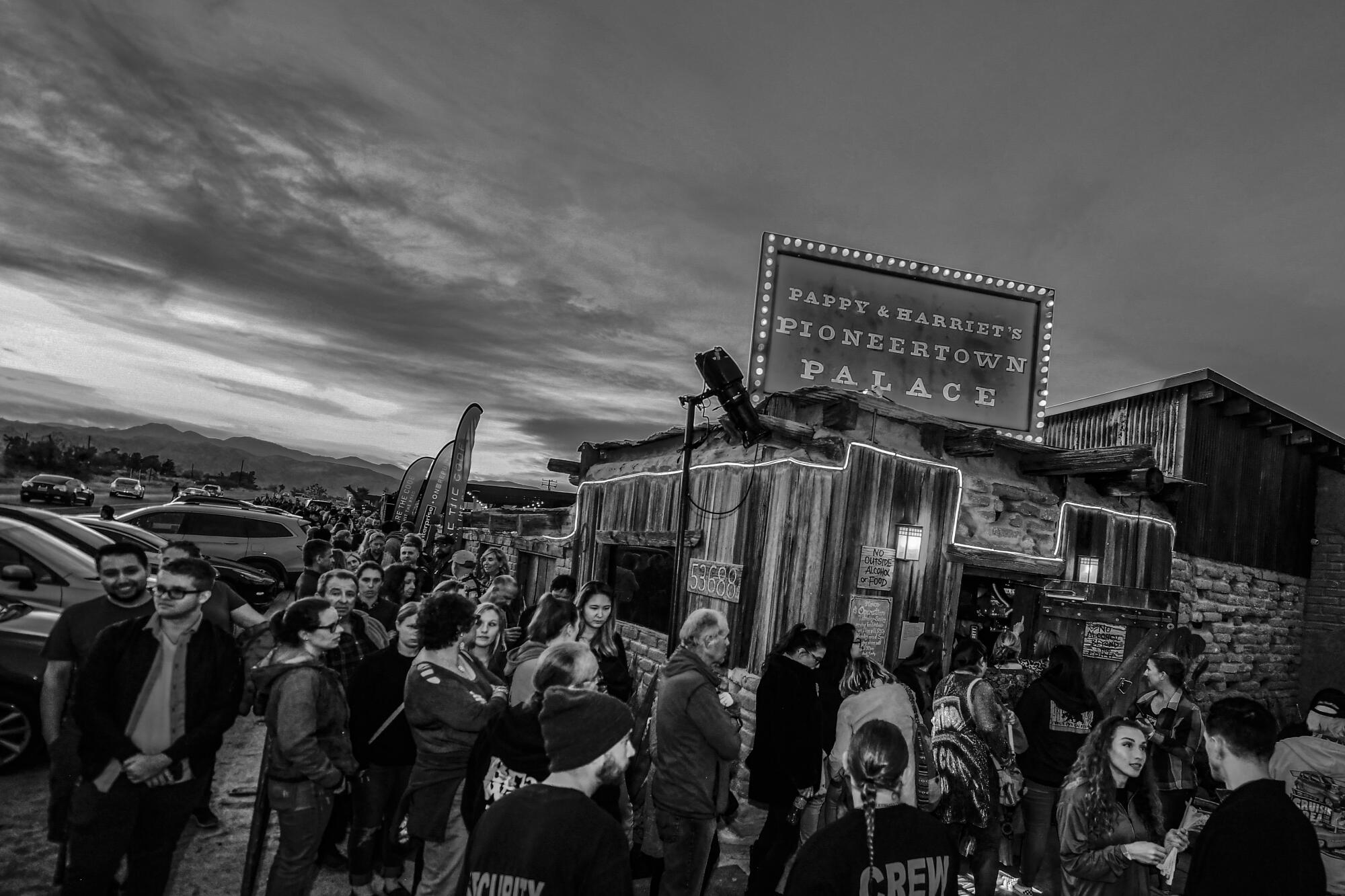
- Share via
In early June 2021, Joseph “J.B.” Moresco and Lisa Elin, co-owners and general partners of Pappy & Harriet’s Pioneertown Palace, the renowned high-desert watering hole and music venue in Pioneertown, Calif., changed the locks on the doors of their new property.
A few months earlier the L.A. couple had, with the financial backing of Tony-nominated producer Stephen Hendel, Knitting Factory Entertainment Chief Executive Morgan Margolis and others, successfully purchased the famed business, set amid a ramshackle town (population 558) four miles north of Yucca Valley and not far from Joshua Tree National Park.
Imagined, like the “Mane Street” area of Pioneertown itself, as a western movie set in the mid-1940s, Pappy & Harriet’s reputation had been cemented after the namesake owners, Claude “Pappy” Allen and his wife Harriet, bought it in 1982. In their hands, it evolved into a kind of oasis for motorcycling misfits and thirsty desert musicians.
Pappy died in 1994. In 2003, Harriet sold the bar to Robyn Celia and Linda Krantz, a New York couple who kept the name, eased their way into the community and built the business into a destination featuring a restaurant and venue.
In the decades since, hundreds of artists such as Paul McCartney, Lana Del Rey and Los Lobos have played there, to say nothing of the countless local artists, including members of Queens of the Stone Age, Concrete Blonde and Eagles of Death Metal, who made their open-mic nights and Sunday Band jam sessions legendary. A teenaged Jason Momoa used to hang after frequent rock-climbing sessions and has been a regular ever since; Anthony Bourdain shot part of a high-desert “No Reservations” episode at the place.
“A lot of memories were made over the years at Pappy & Harriet’s, and not just people that live in town,” says Jesika von Rabbit (Jessica Leischow), co-founder of rock band Gram Rabbit and longtime desert solo artist. “People came from San Diego or Bakersfield — even Paris! — because they heard about Pappy’s. They came to this special haunt because they wanted to have that genuine desert experience.”
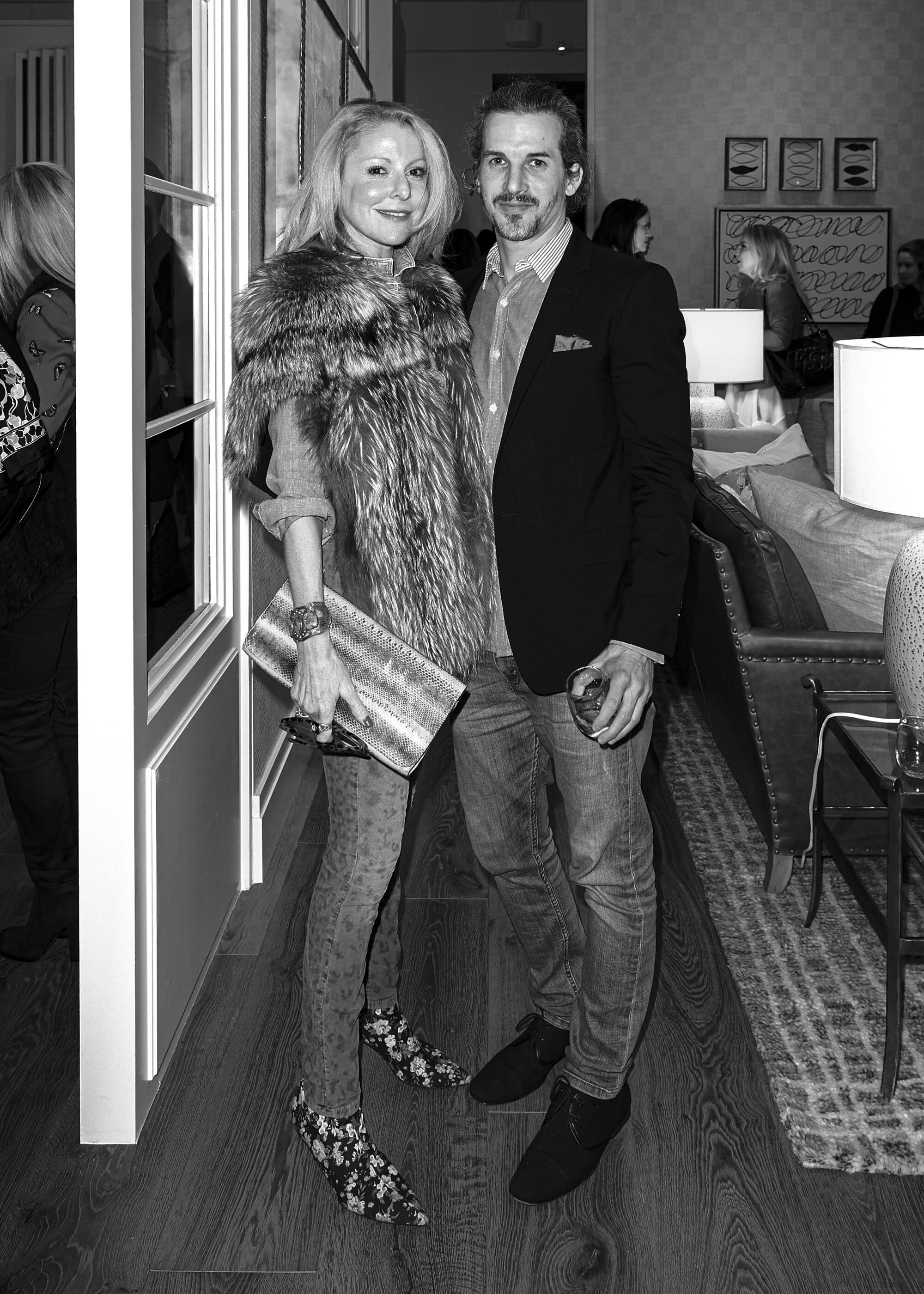
The latest Pappy’s deal imploded almost immediately. Within months of the April 2021 $2.5-million transaction to lease, develop and operate the venue, Margolis, who had helped connect Hendel’s investment arm Dundee Productions to Moresco and Elin, sent the couple a late-night email that Moresco described in a declaration to the court as “angry and threatening.”
“I need to get this cleared or we will go down a bad path in our working relationship,” warned Margolis. “You are micro managing the s— out of me and my company.” Whether the couple understood it or not, Margolis wrote of their disagreements, “it’s real now. I would ask you to step back and think about that for a moment ...”
The couple thought about it.
Besides the locks, Moresco and Elin changed the alarm system, social media passwords, safe codes and bank account information, effectively locking out everyone except themselves. After securing the website, they reworked the Pappy & Harriet’s “history” page by deleting Celia and Krantz’s names as previous owners and characterizing themselves as the club’s sole “stewards” — “One with hair of silver, and one with red. Just like Pappy + Harriet.” Through their attorney, Moresco and Elin declined to comment for this story.
Later that month Hendel, Margolis and minority partner John Chapman sued the couple, alleging breach of contract, breach of fiduciary duty, negligent misrepresentation and a litany of other charges, and asked that Moresco and Elin be removed as general partners.

Subscribers get exclusive access to this story
We’re offering L.A. Times subscribers special access to our best journalism. Thank you for your support.
Explore more Subscriber Exclusive content.
The suit claims that Elin and Moresco have tarnished the Pappy’s brand through their alleged heavy onsite drinking and erratic behavior; put employees in danger during the pandemic; and shunned longtime customers for little apparent reason.
“Multiple agents have told me that they will not work directly with Defendants, and that they seem aggressive, defensive, paranoid, and have no idea what they are doing,” Phil Pirrone, Knitting Factory Entertainment booking agent and Desert Daze music festival founder, said in a declaration submitted to the court. Pirrone declined to be interviewed for this story.
Some city dwellers who’ve moved to the high desert over the last year and a half looking for more space and clean air also found unexpected drawbacks.
For their part, Moresco and Elin have responded that Margolis, Pirrone and Hendel represent an existential threat to Pappy & Harriet’s. The trio’s plans for Pappy’s, they contend, would cause the venue to exceed the number of concerts allowed by the venue’s conditional-use permit, which enables the venue to hold 40 shows per year in its 1,200-capacity outdoor yard. Prior owners Celia and Krantz, who declined to comment, had successfully petitioned the neighborhood and San Bernardino County for the permit after years of effort.
“This suit is nothing but a hostile takeover attempt by New York billionaire Stephen Hendel,” says Moresco and Elin’s attorney Bryan Freedman of Freedman & Taitelman. Referring to a recently filed second amended complaint, he adds, “While we prefer not to litigate in the press, the facts are clear — they have lost every motion, switched lawyers three times, and now, Hendel is completely rewriting the case in his latest plot to steal Pappy & Harriet’s from the community.”
This roadhouse drama has pitted neighbor against neighbor in a remote area where lots are the size of baseball fields and police cars seldom patrol. One longtime resident describes the area as a ring of desert fiefdoms. Added to that is a creeping distrust of the carpetbaggers rolling in from Los Angeles and New York who are changing the culture and nature of the community.
“There’s an excessive amount of drama for such a small, little space,” says Gerry Noonan, a Pioneertown native, restaurateur and the Yucca Valley planning commissioner, who was raised in and around the Red Dog Saloon, a stone’s throw from Pappy’s.
Adds music manager Roy Jürgens, who runs five Airbnbs in the area, “I’ve seen more drama out here in three years than I’ve seen in 30 in L.A.”
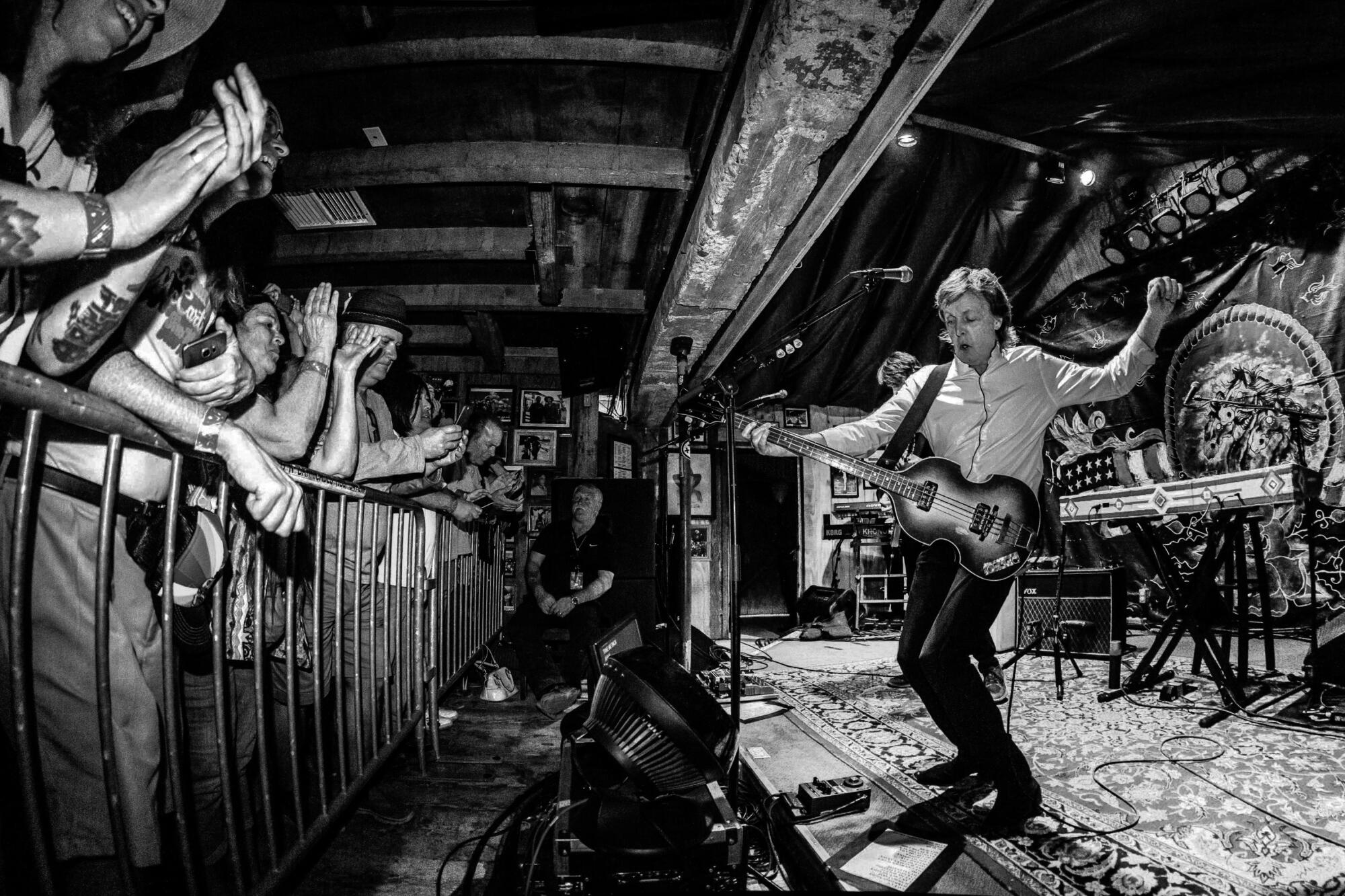
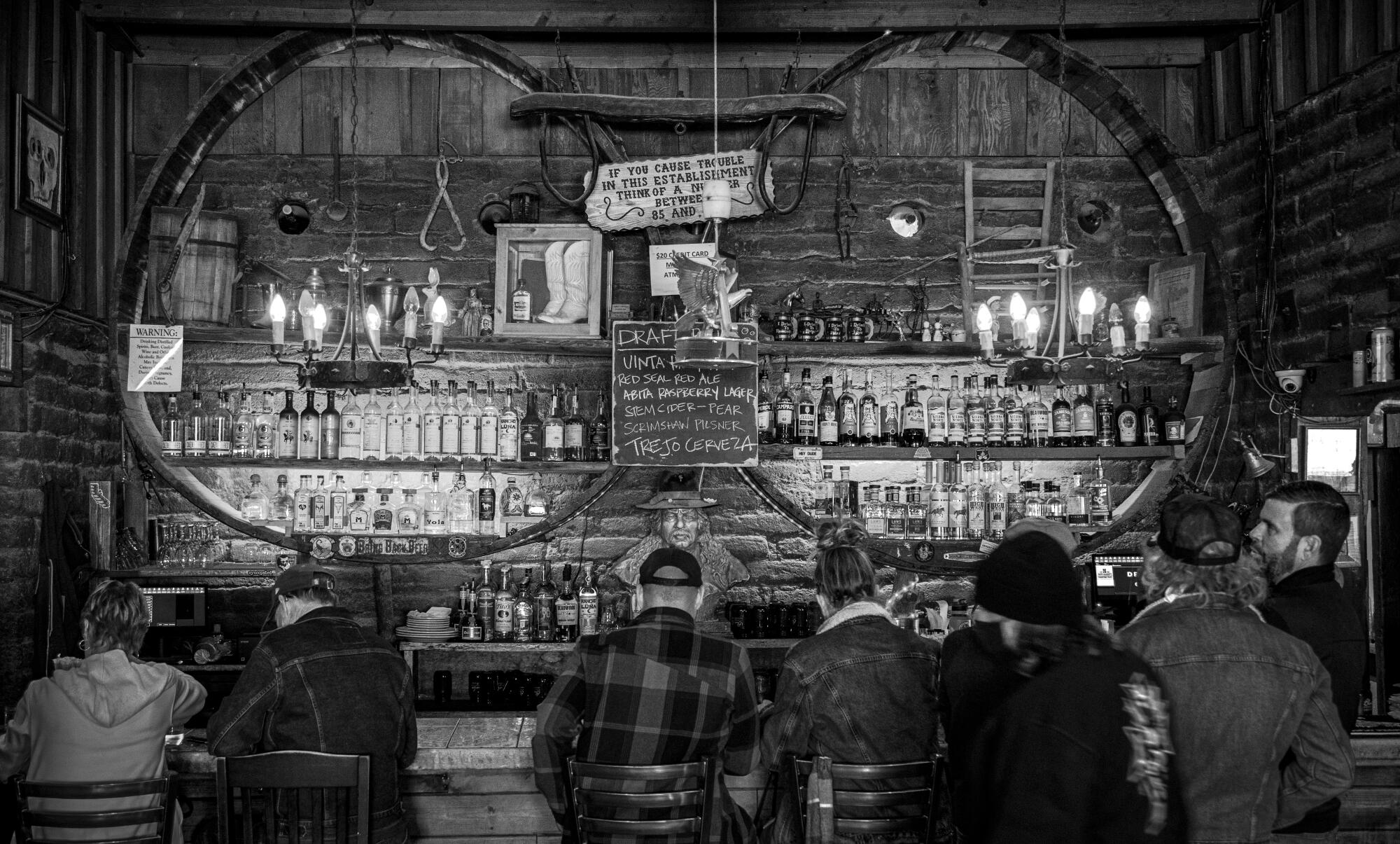
To get to Pappy & Harriet’s, you ascend the meandering Pioneertown Road, which runs through majestic stone landscapes millennia in the making. At the top lies an oasis of rickety buildings built back when cowboy movies were as ubiquitous as Marvel movies are today.
“When you’re driving up to Pappy’s and you see this great rocky, swerving road, you’re like, ‘Where is this taking me?’” says Von Rabbit, who estimates she’s played Pappy & Harriet’s more than 200 times. She compares the journey to “a Disneyland ride that throws you back into a certain setting. The landscape is so different.”
Yucca Valley planning commissioner Noonan was reared by Pioneertown. When his mom, Peggy, owned the Red Dog Saloon, Pappy Allen was a regular member of the venue’s pickup band. Noonan was raised as “the only kid in town running around with a bunch of drunken adults,” he says. His dad was a retired lawman who “used to pull his gun out and shoot cans off people’s heads,” Noonan says with a laugh.
“For years before we moved out here, we would come on Sunday night, get rooms at the Pioneertown Motel and just party all night — have fun and listen to good music,” says Terry Taylor-Castillo, executive director of the Joshua Tree Retreat Center, located in a group of Midcentury Modern bungalows an eight-mile drive from the roadhouse.
Pappy’s success was due in large part to Celia and Krantz’s devotion; one or both of them were at the place every day and treated the staff as family. Musicians and music fans, they persuaded booking agents that the desert town, built in 1946 by investors including singing actors Roy Rogers and Gene Autry and named after the country vocal group Sons of the Pioneers, made an alluring pit stop for acts routed through Phoenix or Las Vegas on the way to L.A.
“I bought my house out here because we were going to Pappy & Harriet’s so frequently that I fell in love with the place,” says Derek Girling of Yucca Valley. He and his wife got married at the Pioneertown Motel behind Pappy’s.
Girling says he first experienced the shift of ownership not long after Moresco and Elin took over and brought in new elaborate security. “And all of a sudden the tenor changed. They were wanding us with metal detectors to get in to the outdoor area — and it’s always seemed to be a place that I never really saw any security issues.”
Until the recent ownership change, Von Rabbit held an esteemed place in the Pappy’s universe: “They had Nachos Von Rabbit on the menu for about 15 years,” she boasts. Her voice turning solemn, she adds, “People loved that appetizer. That’s gone.” Von Rabbit hasn’t been booked since the new owners took over.
The Retreat Center’s Taylor-Castillo is circumspect about such changes. Asked about the current state of Pappy’s, she says that she’s noticed a pattern in the desert. “Whenever you create something through the arts and music and it’s magic and people feel it and they come and experience it, once that happens people with money want to own that. They think they can buy it.”
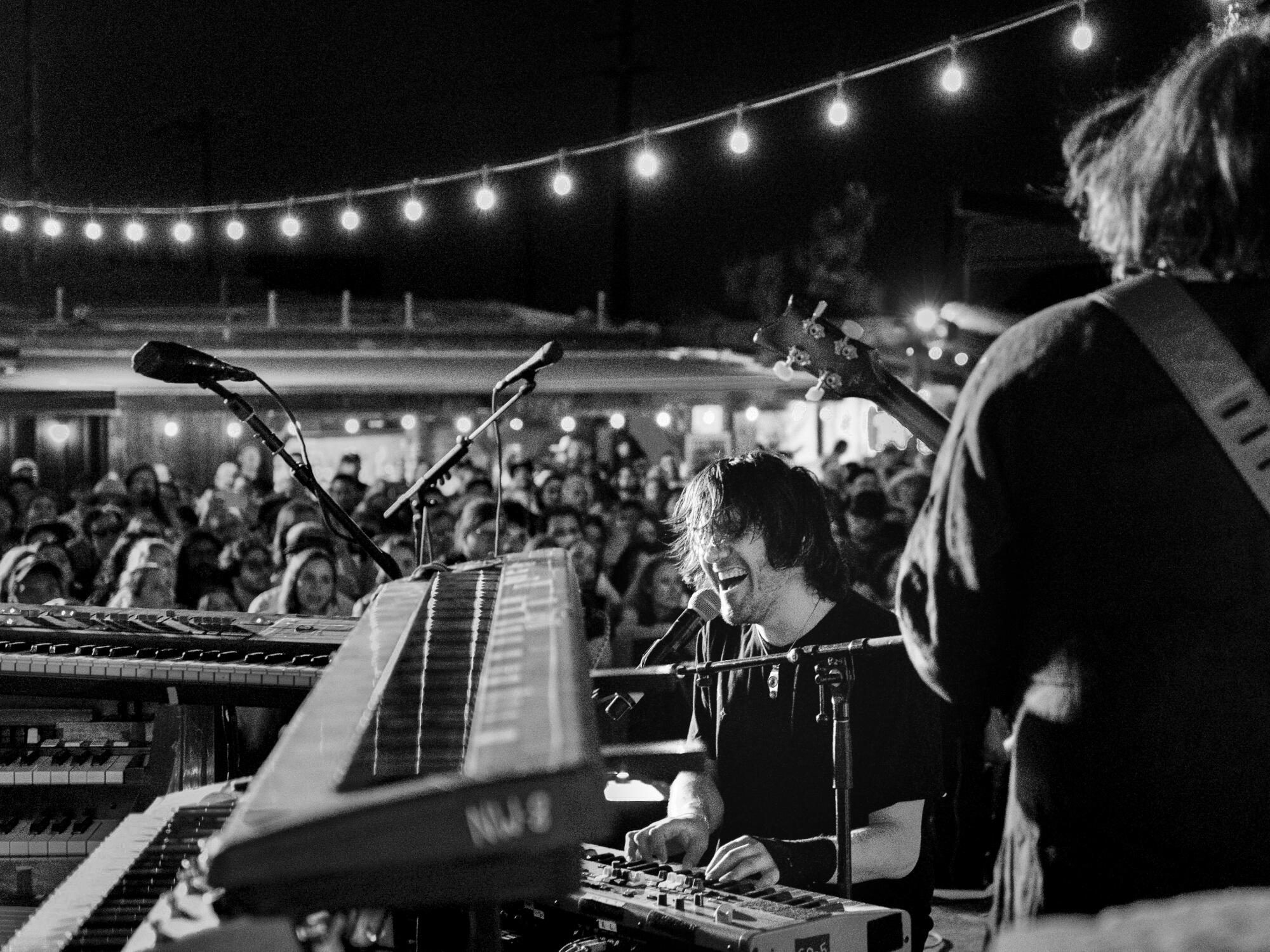
On a recent Sunday evening at Pappy & Harriet’s, hundreds of fans are gathered near the outdoor stage to watch indie-rock bands Hurray for the Riff Raff and Bright Eyes. Patrons had started arriving hours earlier, filling up the inside restaurant and backdoor patio. A few doors down at the Red Dog, some concertgoers grabbed cheap tacos and did tequila shots before moseying over.
As drinks flow and the sun fades behind the rocks, co-owner Elin moves through Pappy’s as if she were cast in a contemporary cowboy flick: flat-brimmed tan hat, black T-shirt, blue jeans and cowboy boots.
Informed during a casual back-and-forth near the outdoor stage that she was easily identifiable as an owner because she worked the room as such, Elin smiles. She carries herself with confidence, mentioning during a brief chat her New York personality, her days at University of Kansas in Lawrence and her Peabody Award. Elin is the subject and “creative producer” of “Vestige,” a 2018 virtual reality documentary short film that explores her grieving process after the 2016 sudden death of her husband, marketing executive and pro skier Erik Craighead.
Professionally, Elin outlines her skills on her website as “helping brands enhance engagement across print, digital, social, and experiential platforms, while maintaining a unique and authentic voice.” In the open-air yard, she declines to comment about the lawsuit.
The next time you’re headed to Joshua Tree, stop at Pappy & Harriet’s Pioneertown Palace for tri-tip and nachos.
She and Moresco, who divide their time between L.A. and the desert, had set their sights on Pappy & Harriet’s before the coronavirus upended the concert economy. A nightclub manager and events coordinator at L.A. hot spots including the Hollywood Roosevelt Hotel and the Standard hotel on Sunset, Moresco is co-owner of the Golden Pagoda (formerly Bar Louie) in Chinatown. For a time, Moresco was also actor Don Johnson’s assistant.
On New Year’s Day 2020, Moresco and Elin were on their way through Palm Springs when they made a detour to say hi to Celia and Krantz; Moresco had met them a few times before. “We ended up hanging out for the afternoon chatting about Pioneertown and PH [Pappy & Harriet’s],” Moresco said in his declaration to the court. “I mentioned in passing that if they ever decided to sell to please call me.”
Such conversations have been occurring throughout the region. Across the last decade, the Joshua Tree area has been transformed by Airbnb rentals and homebuyers priced out of the L.A. market. The pandemic accelerated this shift as workers replaced daily commutes with Zoom meetings in home offices. That transformation, in turn, cost locals their inexpensive housing as landlords sold to home-share investors. Just last month, three buildings on the Joshua Tree Retreat Center’s property opened as a boutique hotel called the Bungalows, the result of a long-term lease agreement with a local developer-hotelier.
“All these L.A. kinds of places have popped up here in a very meat-and-potatoes town,” says music manager Jürgens. “The Airbnb that I’m running right now sold for $94,000 in 2015. It was just assessed at $650,000.”
The sellers met with the potential buyers again right before the coronavirus shuttered nightlife. Celia and Krantz gave Moresco a price. In court filings, he described the sellers as “worried sick” that Pappy’s “would fall into the hands of someone who would seek to exploit the name and attempt to turn PH into another Coachella.”
Moresco added, “They wanted me and my fiancée to purchase PH because they believed that we would be the best stewards of what they had built.” A source close to the deal disputed that characterization.
The parties entered into a contractually binding asset purchase agreement in October 2020 to transfer ownership of Pappy & Harriet’s. Moresco and Elin put $55,000 of their own money in escrow to hold the deal — but they still hadn’t found the other $2.5 million. The agreement set a rapidly approaching deadline of March 1, 2021, to do so.
Moresco connected with the Knitting Factory’s Margolis in early December 2020. Margolis, son of actor Mark Margolis, best known as the cartel kingpin Hector Salamanca in “Breaking Bad,” grew up in New York and moved to L.A. in the early 1990s. He’d tried following his dad into acting but, he told Total Prestige magazine, “acting started to feel more like a drudge job for me.” Gravitating to bar and nightclub operations, he ran several L.A. clubs before landing at ‘90s West Hollywood venue Luna Park.
When the Knitting Factory opened a West Coast outlet in the early 2000s, Margolis joined on. Eight years later he was CEO of Knitting Factory Entertainment, whose holdings include music venues and brew pubs, theatrical and music management arms, a pair of record labels and a national touring division.
Margolis declined to be interviewed for this story. In a statement, attorney Craig Flanders at Blank Rome, who represents the plaintiffs, says, “Our clients look forward to vindicating their rights in court.” He declined further comment.
For cash, Margolis in turn tapped wealthy Knitting Factory investor Hendel, a Yale-schooled attorney, commodities executive and investment banker who, as a longtime music fanatic, produced (along with co-investors Jay-Z and Will and Jada Pinkett Smith) the Broadway show “Fela!,” about Nigerian bandleader and political activist Fela Kuti.
“He seemed to fit the bill,” Moresco said of Margolis and his backer in a declaration filed as part of the proceedings. He recalled Margolis promising that “[w]e just want to help you with your dream.”
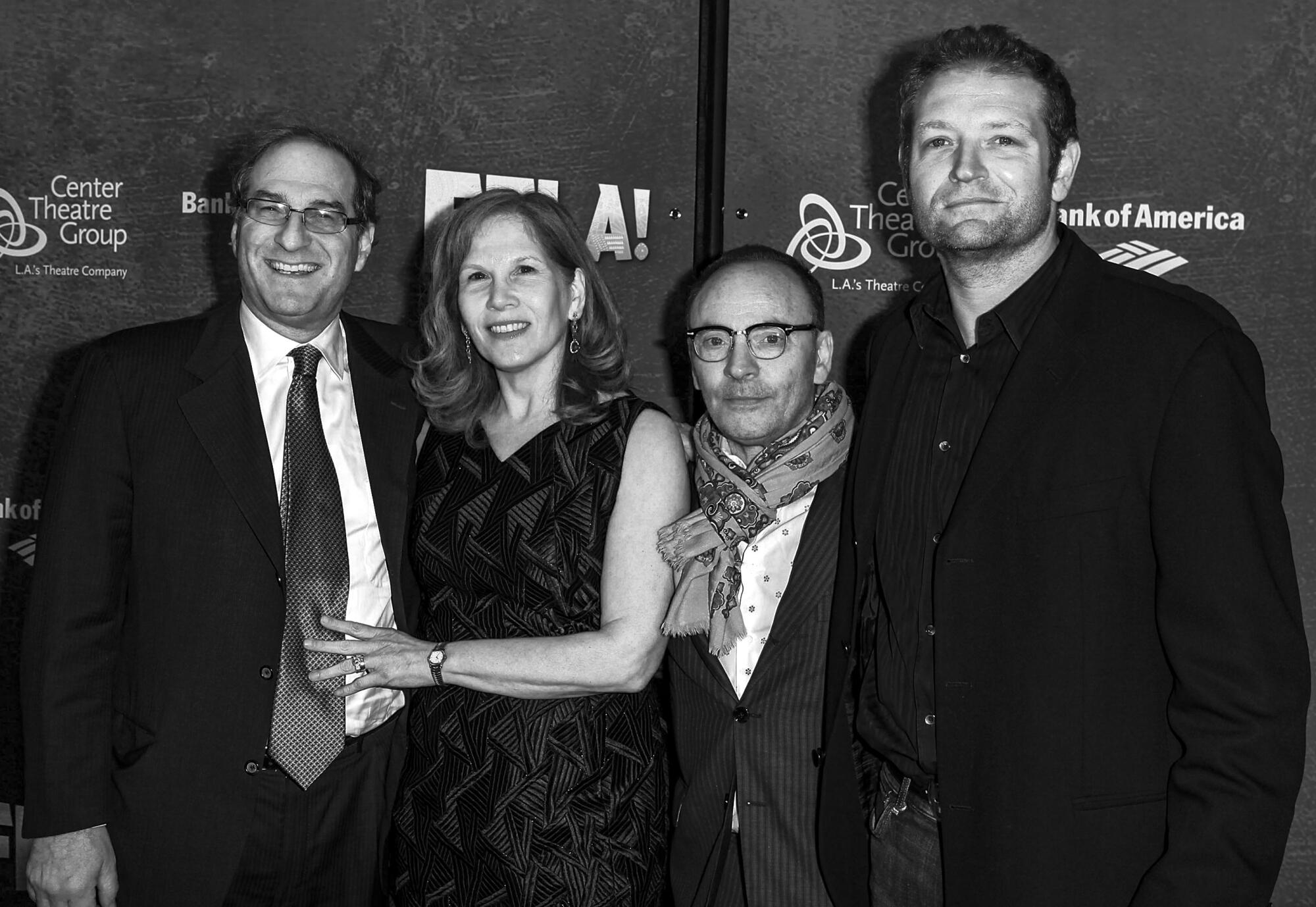
On deadline day, March 1, 2021, Moresco, Elin and Hendel signed a nonbinding term sheet outlining the numbers and ownership stakes.
Hendel would fund the purchase and operations of Pappy & Harriet’s for a majority interest in the partnership, and Moresco and Elin would operate and manage the day-to-day operations as “sweat equity” for their minority interest in the company.
The deal required $2.5 million be paid up front for the brand, assets and the intellectual property. Krantz and Celia would remain owners of the building and the land and would lease it to the partnership; the partnership would have an option to buy it at a later date for $5 million.
The speed of the deal meant that some of the important operational agreements were, in essence, handshake deals. “The term sheet was never intended to be legally binding, but instead merely a roadmap for negotiation,” said Moresco in his declaration.
The terms outlined that Hendel’s company, Dundee Productions Inc., would own 50.5%; Moresco and Elin, 45%; Margolis, 4%; and Chapman, .5%.
Not long after, Moresco signed a talent-buying agreement with Margolis’ Bravo Entertainment, the Knitting Factory-connected booking company that employs Pirrone. Pirrone was well known among the Pappy’s community as curator of the Desert Daze festival, which in previous years had been held in north Palm Springs, Sunset Ranch Oasis in Mecca and the Joshua Tree Retreat Center before moving to Lake Perris.
Pirrone hoped to return Desert Daze back to the desert by utilizing Pappy’s and surrounding properties. Moresco and Elin agreed that Pirrone would serve as Pappy’s booking agent, but that they would retain hiring and firing power and could veto any music bookings that didn’t fit in with their vision. Given a greenlight, on May 12 Desert Daze started teasing the dates and location of the Pappy & Harriet’s-based festival.
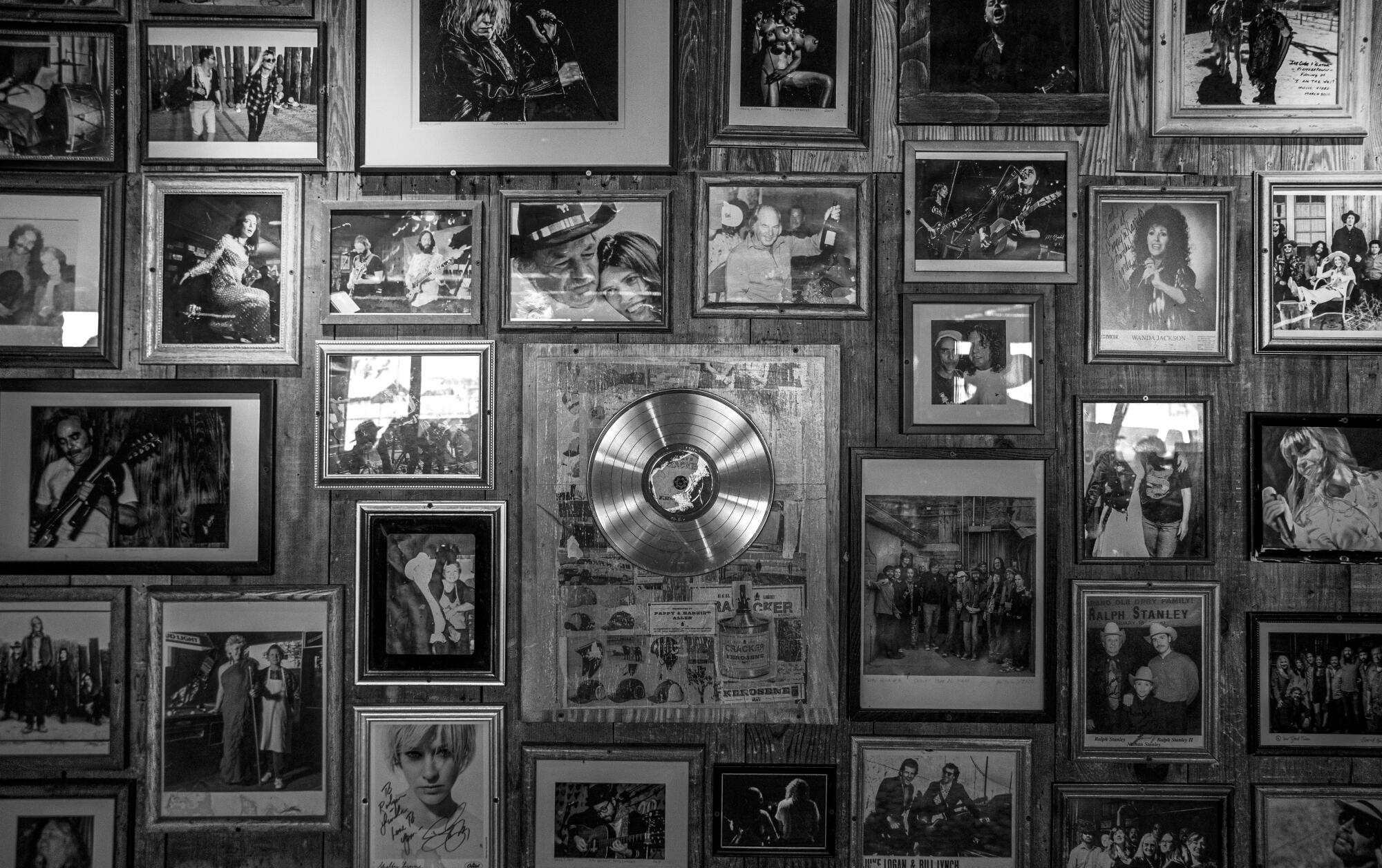
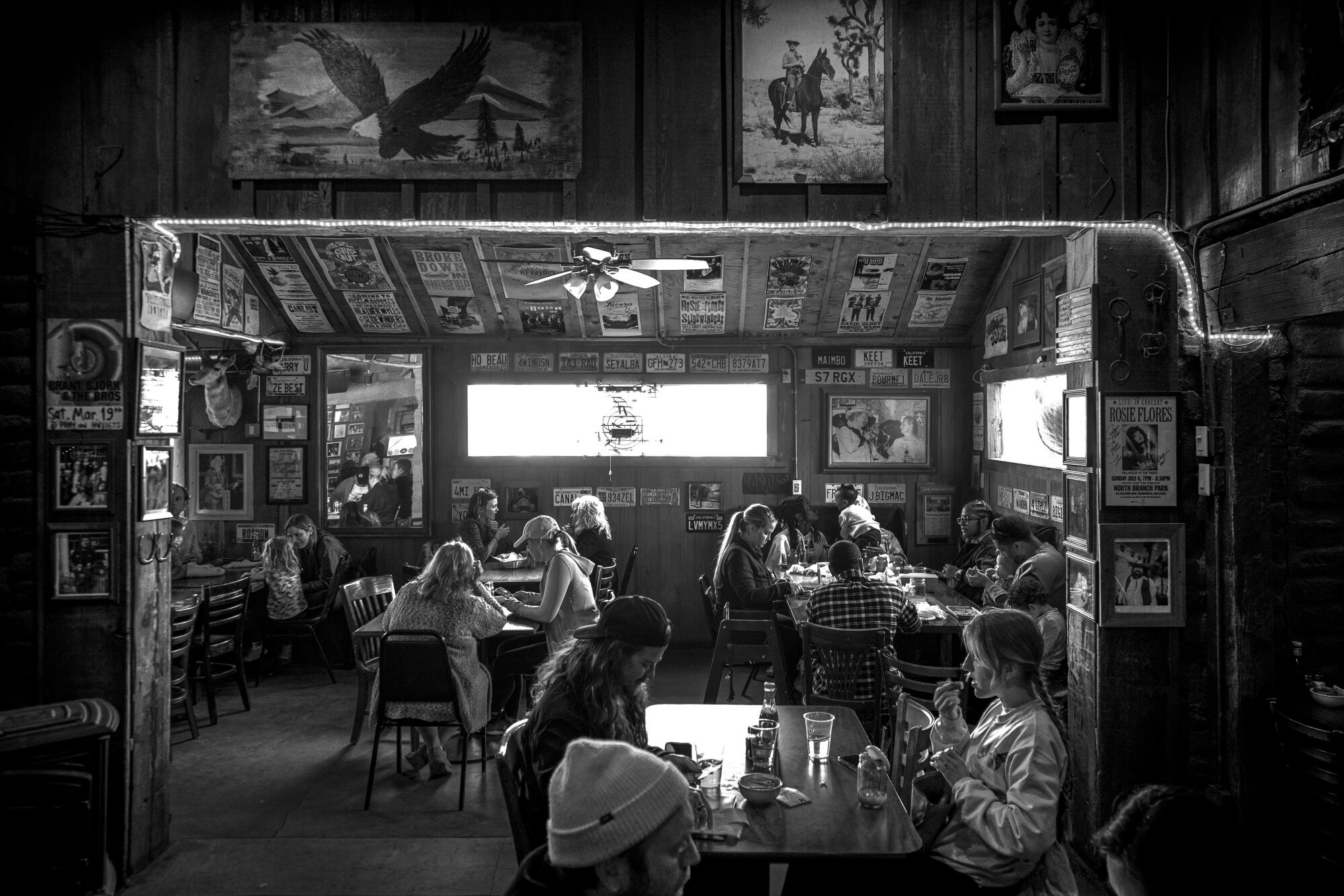
For many, one early incident set the tone for the tension to come. On June 2, 2021, not long before the couple changed the locks and passwords, Moresco approached the grounds of the neighboring Desert Willow Ranch, which was having one of its regular film screenings. As was often the case, some attendees were parking in the Pappy’s lot.
As dusk faded to dark and attendees enjoyed the film, Moresco approached an organizer about cars parked on their property. Courtney Bailey witnessed the scene and sent an email to Margolis the next day. Describing herself as a longtime Pappy’s patron, she wrote that the event organizer had “to get onstage between the band’s songs to tell anyone who was parked at P&Hs to move their cars because the owner was calling ... tow trucks.”
Reached by phone, Bailey says she was shocked how the man she later learned was Moresco handled the situation, which was witnessed by dozens. “Somebody came and started screaming, dropping F-bombs and telling us that they’re gonna tow all of our cars and that we needed to get them out of there.” Bailey recalls thinking, “You’re not even open tonight.”
Moresco disputed that account in his declaration, explaining that he was worried about liability were something to occur in the Pappy’s lot.
As it happened, property owner David Corso, whose nearby “Mane Street” district of western movie sets is a major draw, had also emailed Margolis. A regular for years, Corso was barred from Pappy’s soon after the ownership change because, he wrote, Moresco wrongly believed he had tried to sabotage the Pappy’s sale. Frustrated and confused, Corso wrote to Margolis that he’d reached out to Moresco “through multiple relations to resolve this but he refuses to speak to me.”
He wasn’t the only one cut off. In June, Moresco set his sights on Desert Daze, which due to the pandemic Pirrone planned to reconfigure as Desert Daze Deconstructed. Instead of a ticketed event occurring over three straight days, the 2021 installment would be spread across five weeks — 21 acts divided among half a dozen or so nights of music. Confirmed months before Krantz and Celia sold, Pirrone had been blocking out dates and working with booking agents to lock in the schedule.
When, on June 15, Moresco received a draft copy of the Desert Daze Deconstructed press release for his approval, his whole demeanor changed, say sources who declined to be named because of ongoing litigation. After reading it, according to the suit, Moresco informed Margolis that he “intended to unilaterally terminate all dates on schedule related to the Desert Daze series” because “Margolis and Knitting Factory [had] concealed Desert Daze’s ambition and scope.” Pirrone and Knitting Factory, Moresco said, were “attempting to book shows [at] PH that either made little economic sense to the partnership and/or based upon my reasonable business judgment did not fit the genre of PH.”
Moresco demanded that Pirrone be fired. He also alleged that Margolis had concealed his ownership stake in the festival and was conspiring with Pirrone to build a massive “Coachella-like event.” If that had occurred, Pappy & Harriet’s relationship with their community would be irreparably damaged.
One basis of Moresco’s claim was centered on the supposed threat to Pappy & Harriet’s conditional-use permit that Desert Daze posed. According to Moresco’s declaration, when Pirrone held the event at the Joshua Tree Retreat Center, “the festival so incensed the local community that the County Department of Land Use Services denied a permit for an encore Desert Daze the following October citing too many attendees and excessive noise from the prior year’s event.”
That’s not true, says Taylor-Castillo, the Retreat Center’s executive director and member of the committee that approved both Desert Daze festivals that occurred on the land. The permitting issue “had nothing to do with Phil in particular or any one festival,” she says. Rather than fighting with a few upset neighbors and the county, the Retreat Center decided to stop leasing its land for festivals, Taylor-Castillio explains.
Noonan, who is a board member of the Retreat Center, confirms her account. “I fought hard for that thing simply because I didn’t want to see Phil’s hopes and dreams dashed,” he says.
Pirrone claims in a declaration to the court that Moresco and Elin nixed at least 18 shows that would have generated nearly $200,000 in tickets alone. As Pirrone said in his declaration, “It is my firm belief as a longtime patron and promoter of the arts, and based on feedback from more than several trusted agents in the industry, that defendants’ actions are causing irreparable harm to the business’ reputation and have not shown the ability or knowledge to run Pappy & Harriet’s.”
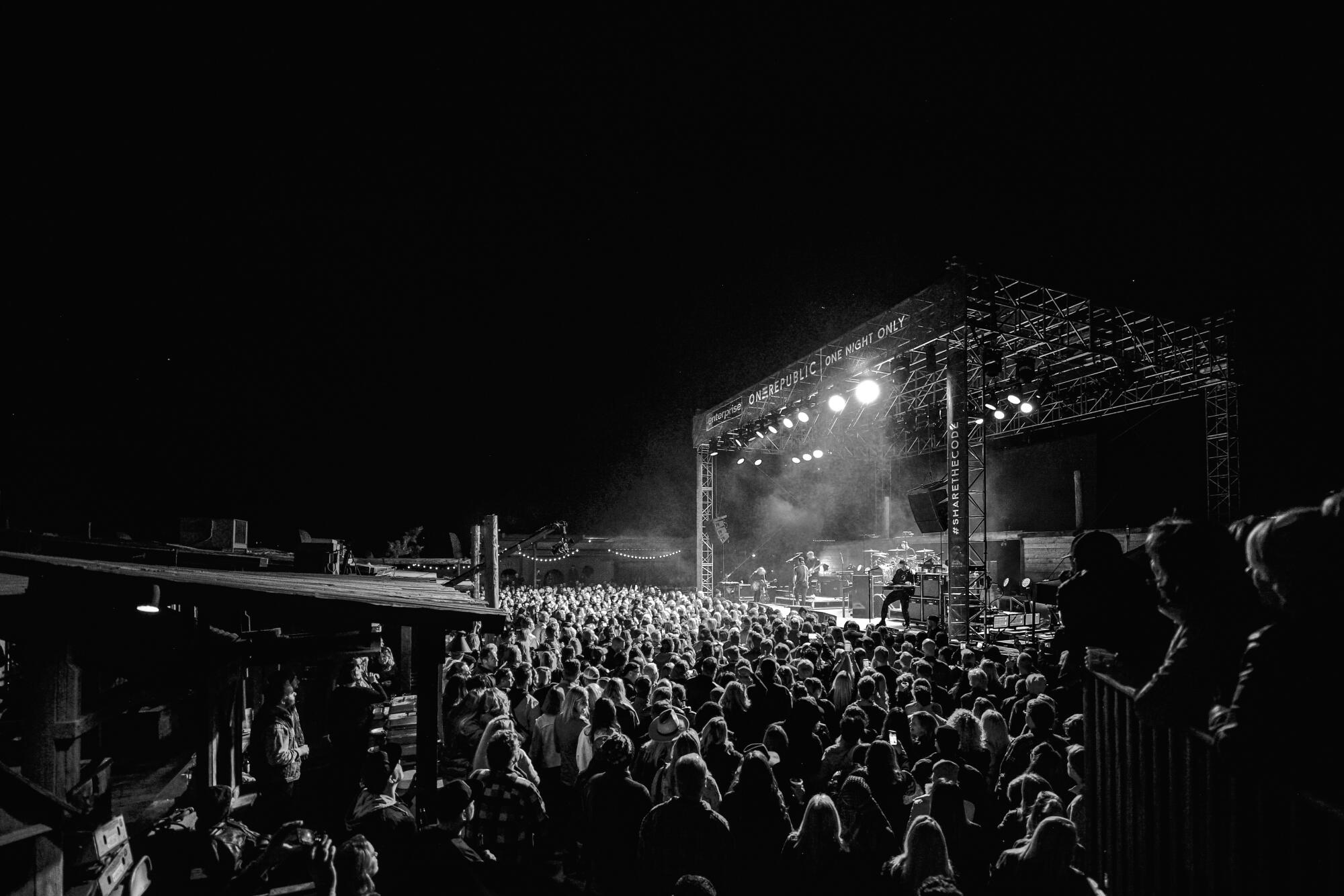
On June 18, Margolis scheduled an emergency Zoom meeting. Moresco and Elin were invited but neither attended. At the meeting, Margolis, Chapman and Hendel unanimously voted to remove Moresco and Elin as general partners and to end their management agreement. Moresco and Elin refused both written and in-person demands by Margolis and the other partners to relinquish the keys and codes.
On June 23, Margolis and company filed suit. Less than a week later, they applied for a restraining order against Moresco and Elin.
That restraining order was denied and on June 30, 2021, Los Angeles County Superior Court Judge Mary H. Strobel ruled that Margolis and team had no legal right to vote them out of the partnership. In the year since, the court has upheld Moresco and Elin’s right to operate Pappy’s while the suit moves through the discovery process. The trial date is set for January 2023. Until then, Cracker, Patti Smith and Os Mutantes are among the artists scheduled to perform at Pappy’s.
Meanwhile, alienated regulars have been finding new places to hang. Two former Pappy & Harriet’s bartenders are now part owners of the Tiny Pony, a Yucca Valley bar that’s become known among locals as Tiny Pappy’s. Another new establishment, AWE Bar, just opened for drinks and bar food, says owner Clark Fyans, a longtime Pappy’s habitué. AWE Bar’s magnet will be a much buzzed-about live venue with a ceiling that’s made of one huge slice of redwood bender board. Fyans and his partners also own more than 300 acres not far from Pappy’s. They’re currently at work on AWE Ranch, a new recording studio.
Though he hasn’t yet announced his AWE Bar concert roster, Fyans says that he’s been in communication with many of the major booking agents in the area. “There’s a lot of people who are going to want to come out here,” he says. “Pappy & Harriet’s is awesome. I’ve always been a huge fan, and it’s unfortunate that it’s got a little bit of a stain on it right now. It’s just such a beautiful spot.”
More to Read
The biggest entertainment stories
Get our big stories about Hollywood, film, television, music, arts, culture and more right in your inbox as soon as they publish.
You may occasionally receive promotional content from the Los Angeles Times.
